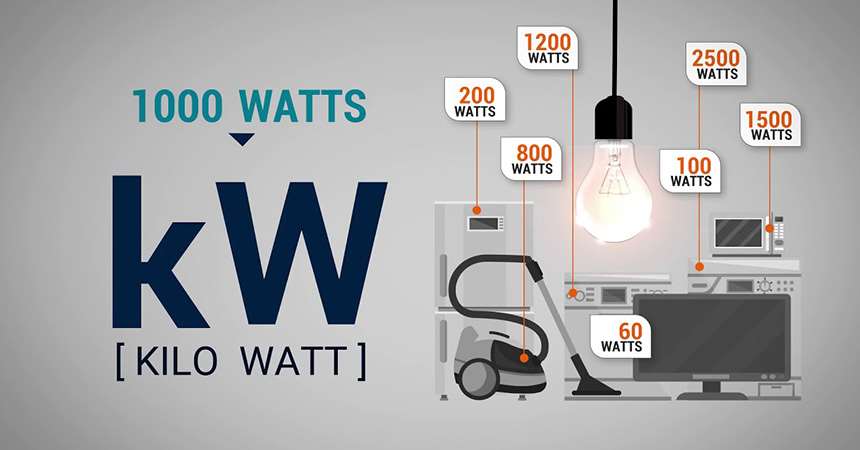Kilowatt Hours Explained: Transforming Energy Consumption with Solar

Kilowatt Hours Explained: Transforming Energy Consumption with Solar
Kilowatt Hours Explained
For many, the term "kilowatt hours" (kWh) only comes up when it's time to pay the electricity bill, leaving us with a vague understanding of what it actually means. Despite this, the humble kWh is a crucial unit of energy that impacts our daily lives far more than we might think, playing a significant role in managing and reducing our energy consumption.
Understanding kWh is not just about keeping a tab on utility bills; it's about making informed energy choices, like figuring out the number of solar panels needed for a home. So, what exactly is a kWh, and how does it differ from a kilowatt (kW)? Let’s dive into the world of energy units to uncover the significance of kWh and how it can help improve your energy efficiency.
The Basics: kW versus kWh Explained
Although kW and kWh might sound similar, they measure different aspects of energy. Starting with the basics, a watt represents the rate of energy production or consumption. For instance, a 100 W lightbulb consumes energy faster than a 60 W lightbulb. Converting watts to kilowatts is straightforward: 1,000 watts equals one kW. However, these measurements only capture instantaneous energy use, unlike kWh, which accounts for energy consumption over time.
A kilowatt-hour represents the energy needed by a device to operate for one hour. For example, using a 1.2 kW dishwasher for an hour consumes 1.2 kWh of energy. This unit is essential for understanding your energy consumption, especially when it comes to your electric bill, which charges you based on kWh used.
Deciphering kWh: Understanding Energy Consumption
The real utility of kWh comes into play when calculating electricity usage. Take a 1.5 kW hair dryer: its energy consumption varies with usage duration. Using it for an hour consumes 1.5 kWh, but 15 minutes of use will consume far less. This principle also applies to generating technologies like solar panels, where the output depends on both the power rating and operational hours.
Your utility bill is a great starting point for understanding energy consumption, usually detailing your kWh usage. Additionally, installing an electricity usage monitor or using the US Department of Energy’s energy use calculator can provide deeper insights into your energy habits, helping you pinpoint where savings can be made.
Calculating Energy Use and Savings
Understanding how to calculate your devices' energy consumption is key to managing your electric bill. By using simple formulas, you can determine the daily and annual kWh consumption of any appliance, helping you identify which appliances are the most energy-intensive and where potential savings lie.
The US Department of Energy provides valuable resources for estimating the energy use of common household appliances, aiding in budgeting for energy costs more effectively. By being mindful of the energy consumption of appliances, you can make more energy-efficient choices, leading to significant savings on your electricity bill.
In essence, a deeper understanding of kWh and how it's calculated can empower you to make smarter energy decisions, from optimizing your home’s energy use to transitioning to solar power. By demystifying kWh, you’re not just reducing your monthly electric bill; you’re also contributing to a more sustainable energy future.
Explore the Solar Advantage with Viridis Energy
Embracing energy-efficient solutions extends beyond mere appliance swaps and into the realm of generating sustainable power. At Viridis Energy, we advocate for the transformative impact of solar energy, not only as a means to foster environmental stewardship but also as a strategy to achieve significant savings on your monthly utility expenses. Solar energy empowers you to produce your own electricity directly from the sun's rays, diminishing your dependence on conventional power supplies and, consequently, reducing your grid electricity consumption. Moreover, with the ability to return surplus solar power to the grid through net metering, you stand to gain credits or even monetary returns from your utility provider, amplifying the benefits of your investment in solar.
At Viridis Energy, our Solar Advisors are committed to demystifying the solar conversion process for you. From interpreting your energy bills to overseeing the installation, we ensure that every aspect of your solar journey is handled with expertise. Our approach is deeply customized, acknowledging that each home possesses distinct energy requirements. We tailor-design each solar solution to align perfectly with your home's specific needs, ensuring maximum efficiency and satisfaction.
Proudly standing as a leading provider of home solar and battery solutions, Viridis Energy is dedicated to supporting you from the conceptualization of your solar system to the exhilarating moment when it comes to life. Our bespoke service model guarantees that your transition to solar is informed, seamless, and utterly stress-free, allowing you to fully tap into the vast benefits of solar energy with complete peace of mind.
SEE HOW MUCH YOU CAN SAVE BY GOING SOLAR
CALCULATE YOUR SAVINGS
